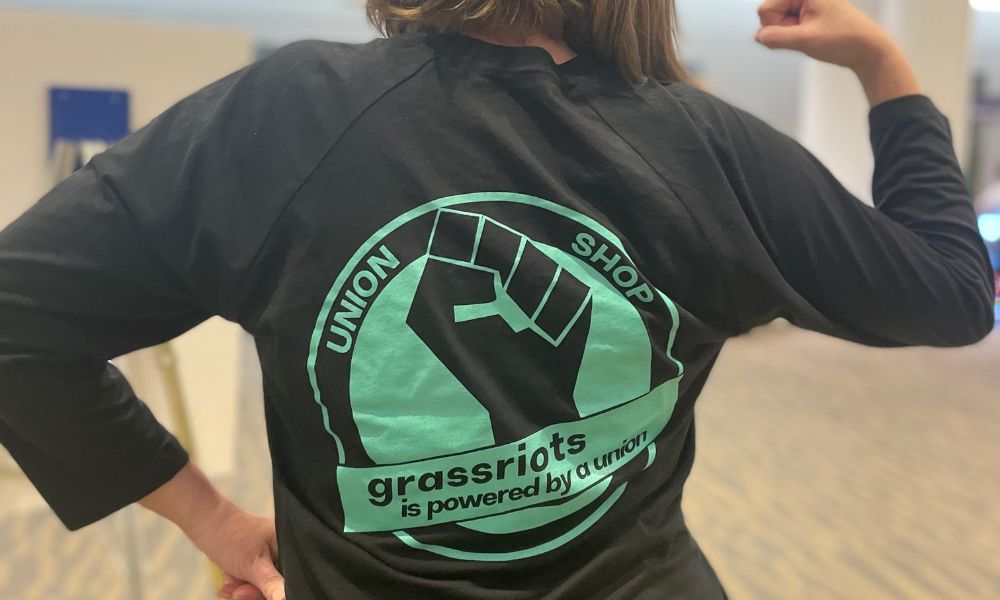
Digital agency head talks about unionizing her digital workforce in Canada

With new legislation on the way reducing the ability for employers to keep work going during strikes, employers may be wondering when their own workforce will decide to unionize, and planning for the worst. But it doesn’t need to be that way, according to the head of a Toronto digital agency that has chosen to embrace the unionization of their workforce instead of fighting it.
Grassriots employees voted to unionize in November of 2022, and the agreement was ratified in September of this year, becoming members of CUPE 1281. Leah Henderson, managing director of Grassriots, said it’s about aligning values with the bigger picture of the Canadian union landscape.
“The labour movement in Canada has been talking a lot about, how do we bring about the unionization of professional workplaces that have younger folks and different kinds of jobs in them? As a tech agency, we were excited for digital agencies to have a space in the labor movement,” Henderson told HRD. “We think the labor movement in Canada is pushing forward values of equity and justice and a stronger, better society. So as a company, we support those values, and we were excited for our workers to join the labor movement and wanted to be supportive of that.”

For Henderson and her staff, the decision to unionize wasn’t only about gaining benefits and better working hours – in fact benefits weren’t on the table as Grassriots already offered dental and health benefits.
It was about participating in the Canadian labour union by bringing “younger” more digital companies to the space. This included writing progressive language, such as DEI obligations, right into the collective agreement.
“At the top of our collective agreement, the first part of the language is about how we believe in a more just and equitable world, and we want to work together, and I really think leading from the heart and leading from our values was part of how we set the stage for being in collaboration together,” said Henderson. “I think in a lot of workplaces, it's like the union has all these progressive ideas that they’re pushing forward, and the employer is trying to hold them back. And we said no [to that] from the beginning – we share a vision for a world that supports workers, that believes in fighting racism, and I think that really set the stage for a collaborative approach.
With a workforce of 12 and a fully remote workforce, unionizing presented some challenges that Henderson said was due to the legal process being “dated” and even potentially adversarial. For instance, the simple requirement for an employer to post voting results in their office.
“Only 10% of our staff even live in the city where our office was located, and none of the management did, so all of a sudden it was 10 p.m. and we realized we had to tape this to the wall, and so I'm driving into the city to tape something to a wall where I know none of my staff are going to be or see it. So the law itself hasn't caught up to the digital, remote work,” Henderson explained.
“It just feels so dated. It doesn't work for remote workplaces. It doesn't work for a digital workplace. It doesn't work for a younger professionalized labour force. If we were an employer that wanted to undermine or do the bare minimum when it came to the unionization process, there are ways that we could have done that by for example, just posting in the office, but we really were trying to take on the spirit of what all of those guidelines are for, and so we went above and beyond that, in order to make sure that all of our staff knew everything that they needed to know about know about the process.”
A fully remote workplace was a main demand of the Grassriots workers, and it was one that Henderson’s team was happy to meet as in their view it made sense for the digital nature of their company. But Henderson, who has a background in union work, said that employers who are digging their heels in about bringing employees back to the office are missing the point.
“We believe in the data, that workers are just as productive at home, if not more so. And we're seeing that data in study after study,” she said. “It feels archaic, that employers are fighting that.”
For Henderson’s management team, it comes down to trusting your talent, and showing that through actions. For example, they have started offering full office setup stipends for new employees to purchase office furniture including desks and chairs, that they don’t have to reimburse or return.
“It is about providing that work life balance that everybody needs. And then also really recognizing that workers, when they have what they need, when they're supported, which includes being in a remote workplace, they're going to be employees that you can count on,” Henderson said. “You need to trust your employees. And if you don't, there's a bigger cultural problem.”
One of the main tenets of the union adoption at Grassriots, and something Henderson is especially proud of, is the establishment of a Labour Management Committee, comprised of two members of management and two members from the bargaining unit. The committee is responsible for regular conversations around how the collective agreement is being implemented.
This reduces the chance of employee discontent that she said can gather from only discussing the agreement during negotiations, she said.
“We wanted to have an ongoing dialogue with our employees. We wanted to make sure that we maintained healthy, strong relationships with each other, that we could address issues together and collaborate between terms of collective bargaining,” Henderson said.
“Being able to have that ongoing conversation, I just think it's great for relationships. But also, I think that it puts us in a really strong position four years from now when we're renegotiating our collective agreement, because we're not saving up four years worth of issues to address and resentments about how it is being handled. Instead, we're addressing them as we go through this first four years.”